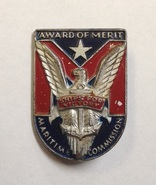Maritime Commission Award of Merit Pin
In the nearly 20 years following the end of the first World War, America's merchant fleet was becoming obsolete and declining in numbers. The maritime commission, created as a result of the 1936 Merchant Marine Act, was tasked with dramatically increasing production of merchant ships. Once the United States became involved in World War II, the program became critical in order to meet the transport demands of the war. Much of the success of the program revolved around the 'Liberty Ships'. These ships were originally British design, but the design had been modified to better accommodate American construction techniques, and resulted in them being able to be mass-produced on a cheaper and timelier basis. Using assembly-line production methods, the ships were constructed of standard components, and were prefabricated in sections. The final assembly was completed by welding, as opposed to the more traditional riveting, the sections together. Many shipyards consistently constructed ships in 50 days, and some in as little as 40 days.
A total of 2,751 Liberty ships were constructed between 1941 and 1945. The main drawbacks of the Liberty ship were its inability to carry larger volumes of war materials and also its relatively slow speed, which made is easy prey for both submarine and aerial assault. Approximately 200 Liberty ships were lost to enemy action, weather and accidents during the war. Recognizing that larger and faster ships were needed, the 'Victory Ship' was conceived and construction commenced mid-war. A total of 531 Victory ships were built. These ships were slightly larger than the Liberty ships, and had a fine raked bow and a 'cruiser' stern that helped allow them to achieve greater speed. Coupled with improvements in the engines, the Victory ships could make 15 to 17 knots, which was 4 to 6 knots faster than the Liberty's, and also had a longer range. These ships contributed significantly to both keeping our own military supplied, as well as being used extensively to transport lend-lease materials to allied nations.
A total of 2,751 Liberty ships were constructed between 1941 and 1945. The main drawbacks of the Liberty ship were its inability to carry larger volumes of war materials and also its relatively slow speed, which made is easy prey for both submarine and aerial assault. Approximately 200 Liberty ships were lost to enemy action, weather and accidents during the war. Recognizing that larger and faster ships were needed, the 'Victory Ship' was conceived and construction commenced mid-war. A total of 531 Victory ships were built. These ships were slightly larger than the Liberty ships, and had a fine raked bow and a 'cruiser' stern that helped allow them to achieve greater speed. Coupled with improvements in the engines, the Victory ships could make 15 to 17 knots, which was 4 to 6 knots faster than the Liberty's, and also had a longer range. These ships contributed significantly to both keeping our own military supplied, as well as being used extensively to transport lend-lease materials to allied nations.
